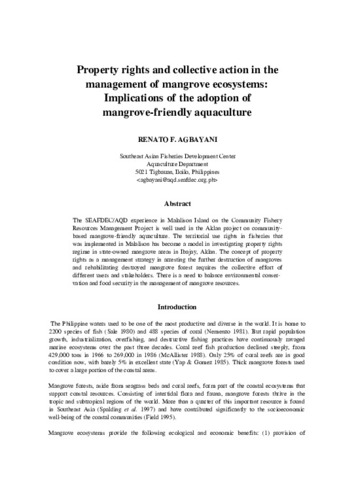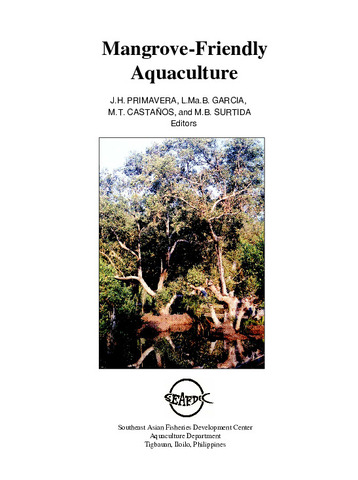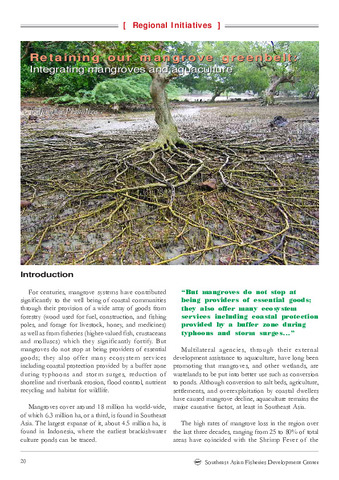Property rights and collective action in the management of mangrove ecosystems: Implications of the adoption of mangrove friendly-aquaculture
- Global styles
- MLA
- Vancouver
- Elsevier - Harvard
- APA
- Help
Share
นามธรรม
The SEAFDEC/AQD experience in Malalison Island on the Community Fishery Resources Management Project is well used in the Aklan project on community-based mangrove-friendly aquaculture. The territorial use rights in fisheries that was implemented in Malalison has become a model in investigating property rights regime in state-owned mangrove areas in Ibajay, Aklan. The concept of property rights as a management strategy in arresting the further destruction of mangroves and rehabilitating destroyed mangrove forest requires the collective effort of different users and stakeholders. There is a need to balance environmental conservation and food security in the management of mangrove resources.
การอ้างอิง
Agbayani, R. F. (2000). Property rights and collective action in the management of mangrove ecosystems: implications of the adoption of mangrove friendly-aquaculture. In J. H. Primavera, L. M. B. Garcia, M. T. Castaños, & M. B. Surtida (Eds.), Mangrove-Friendly Aquaculture: Proceedings of the Workshop on Mangrove-Friendly Aquaculture organized by the SEAFDEC Aquaculture Department, January 11-15, 1999, Iloilo City, Philippines (pp. 163-170). Tigbauan, Iloilo, Philippines: Southeast Asian Fisheries Development Center, Aquaculture Department.
Type
Conference paperISBN
9718511423คอลเลกชัน
Related items
Showing items related by title, author, creator and subject.
-
Mangroves as nurseries: Shrimp populations in mangrove and non-mangrove habitats
Primavera, J. H. (Elsevier, 1998)A total of 4845 penaeids belonging to nine species—Metapenaeus anchistus, M. ensis, M. moyebi, M. philippinensis, Penaeus merguiensis, P. monodon, P. semisulcatus, P. latisulcatus and Metapenaeopsis palmensis—were collected ... -
Mangrove-Friendly Aquaculture : Proceedings of the Workshop on Mangrove-Friendly Aquaculture organized by the SEAFDEC Aquaculture Department, January 11-15, 1999, Iloilo City, Philippines
Primavera, Jurgenne H.; Garcia, Luis Ma. B.; Castaños, Milagros T.; Surtida, Marilyn B. (Aquaculture Department, Southeast Asian Fisheries Development Center, 2000)The proceedings have three review papers on the mangroves of Southeast Asia, silvofisheries, and Indonesia's integrated mangrove forest and aquaculture systems. The rest of the papers, all on mangrove-friendly aquaculture ... -
Retaining our mangrove greenbelt: Integrating mangroves and aquaculture
Although multilateral agencies in Southeast Asia have long been promoting that mangroves, and other wetlands, are wastelands to be put into better use, such as conversion to ponds. However, there is a need for Mangrove ...







